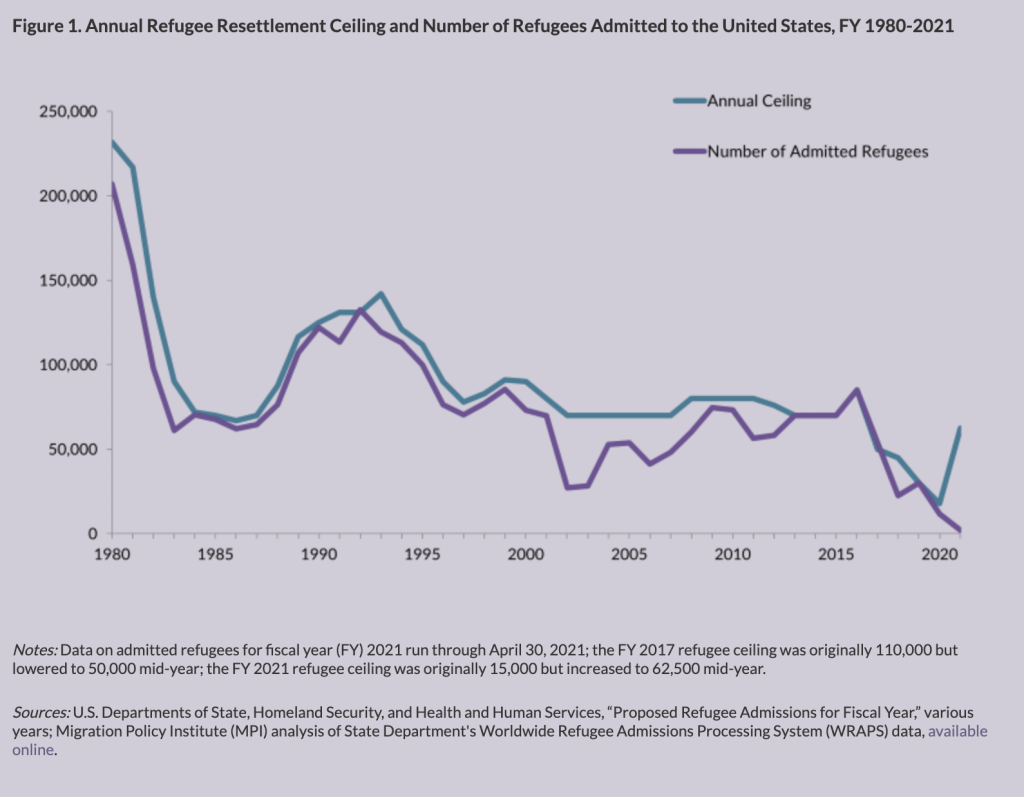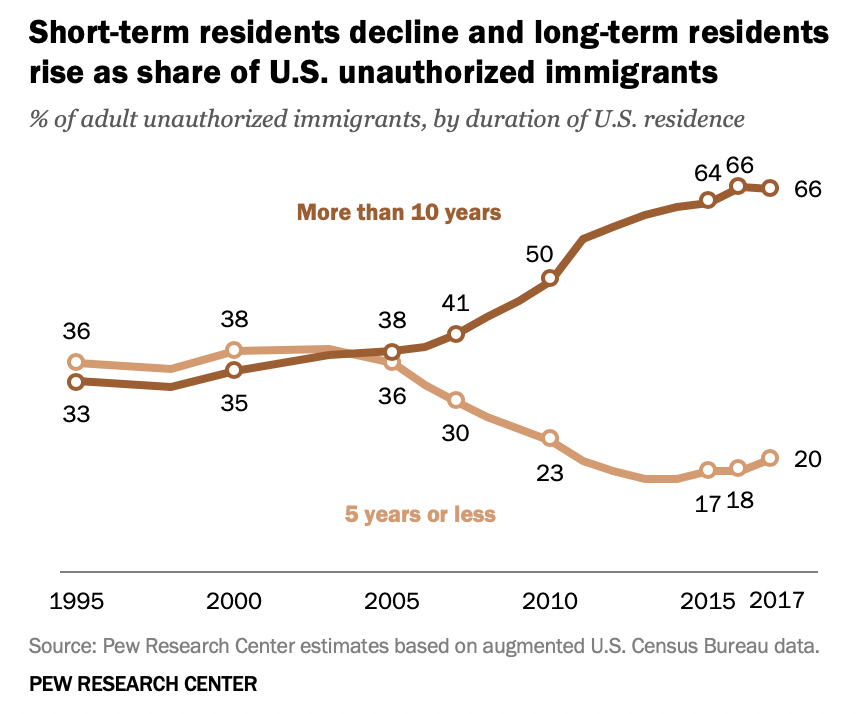Biden's overhaul of the asylum system has impacted small and large U.S. cities. A new rule went into effect on May 31, attracting over 1 million new asylum seekers to the U.S. About 5 million illegals have allegedly crossed the southern border since Biden took office, not including the "got-aways." The new rule promotes an expedited process for asylum seekers, a process that meaningfully circumvents the standard procedure. It is usually an immigration judge who processes asylum requests. "Instead, they will first be sent to a U.S. Citizenship and Immigration Services (USCIS) asylum office for an Asylum Merits Interview, where their credible fear interview will count as their asylum/refugee application," writes Aaron Reichlin-Melnick with Immigration Impact. The rule is effectively a rubber stamp on what is usually a much more rigorous process that protects U.S. taxpayers from an undue burden.
Asylum is generally reserved for those with well-documented, credible fears of prosecution in their native countries. The term does not apply to those who may be economically disadvantaged or live in impoverished, crime-ridden communities. If that were the case, millions of Americans should also qualify for taxpayer-funded housing and benefits. Even former President Obama seemed to understand that refugee status is narrowly defined. After his 2014 meeting with Central American Presidents, Obama defined refugee status during the ensuing question and answer session,
And as I explained to my fellow Presidents, under U.S. law, we admit a certain number of refugees from all around the world based on some fairly narrow criteria. And typically, refugee status is not granted just based on economic need or because a family lives in a bad neighborhood or poverty. It's typically defined fairly narrowly -- the state, for example, that was targeting political activists and they need to get out of the country for fear of prosecution or even death.
There may be some narrow circumstances in which there is a humanitarian or a refugee status that a family might be eligible for. If that were the case, it would be better for them to be able to apply in-country rather than take a very dangerous journey all the way up to Texas to make those same claims. But I think it's important to recognize that that would not necessarily accommodate a large number of additional migrants.
The crisis on our borders is unprecedented both in numbers and in composition. It is now a global community flooding our borders. Biden coined it as a "hemispheric challenge," promising to "cooperate closely to facilitate safe, orderly, humane, and regular migration and, as appropriate, promote safe and dignified returns." Never before have we seen so many countries represented at our borders. More importantly, there are nowhere close to 100 plus countries whose people are subjected to the type of persecution required to qualify for refugee/asylum status.
Sadly, the surge is unprecedented at a time in our country when federal policies are exerting massive economic pressures on the average American family. In his latest substack, Steve Cortes writes,
"Regarding those NGO's and their radical agenda to effectively vaporize the U.S. border, the New York Post recently reported that the "Organization for Migration" actually hands out pre-loaded $800 debit cards to trespassers in Mexico before they even enter the United States, paid for by the U.S. State Department.
Contrast that largesse with the present financial pain endured by American citizens. At present, 20 million U.S. households are behind in their utility bills and face a "tsunami of shutoffs," according to Bloomberg reporting. Just as troubling, of the massive 13.5 million Americans who are not current on their rent or mortgage, 40% of them – or 5.4 million people – expect to be evicted or foreclosed upon in the next two months."
Small Towns Across America Burdened by Influx of Refugees
Portland, Maine, with a population of approximately 67,000, represents just one example of the impact of Biden's immigration policies. The small city is suffering a significant migrant crisis and is grappling with the financial and practical support systems needed to deal with the 1200-plus asylum seekers who have settled within "a three-county area," as explained by Center for Immigration Studies Fellow Andrew R. Arthur. The town requested $150 million through FEMA's Emergency Food and Shelter Program (EFSP), a DHS program. Portland has asked for an additional $23 million for FY2023.
Arthur explains that Portland hit the proverbial wall in May of 2022 when it struggled to find housing for approximately 1800 homeless people—1200 of whom are international refugees. Kristen Dow, the city's Health and Human Services director, sent an urgent email to CBP and other immigration officials, FEMA, the office of local U.S. Rep. Chellie Pingree (D), Portland's city council and mayor, and "community partners" in early May, which read:
"I am writing this email to alert you to the fact that as of the date of this email, there is no further shelter OR hotel capacity in Portland, Maine. We have been over capacity in our shelter for quite some time and have now reached the point where the hotels we have been utilizing are also full. . . .
Please know that as a result of our capacity limitations, if your organization sends a family to Portland, Maine, they are no longer guaranteed shelter upon their arrival to our shelter. Additionally, because our staff are spread quite thin, it is not guaranteed that we will be in a position to aid individuals in their search for emergency housing. I ask that you all share this information widely within your organizations and with families you are working with."
In addition to federal funding, the city has resorted to injecting "$22 million in the state's supplemental budget for emergency housing assistance." Greg Payne, the senior housing advisor to Maine Governor Janet Mills (D), said the state "is also looking for additional hotel rooms where people experiencing homelessness and asylum seekers could be housed."
Big Cities Resources Also Strained by Migrant Crisis
New York City's homeless shelters are being inundated with illegals seeking asylum "with nearly 3,000 arriving in recent weeks," according to Mayor Eric Adams. Some arrivals result from Texas Governor Gregg Abbott's busing of illegals (Operation Lone Star) to interior cities like New York and Washington, D.C., where Mayor Bowser has called for the National Guard to help with the migrant crisis.
The United States leads the world in refugee resettlement numbers. Those numbers fell under President Trump, however. Biden seeks to "reverse that trend," pledging to resettle upwards of 125,000 in FY2022. Former President Trump set the number at an historic low of 15,000. Annual resettlement ceilings are depicted on the graph below since the program started in 1980.
 Historic Resettlement Numbers/https://www.migrationpolicy.org/article/refugees-and-asylees-united-states-2021?gclid=EAIaIQobChMIjsXcw6OD-gIVFq7ICh0e2g4zEAAYASAAEgLshvD_BwE
Historic Resettlement Numbers/https://www.migrationpolicy.org/article/refugees-and-asylees-united-states-2021?gclid=EAIaIQobChMIjsXcw6OD-gIVFq7ICh0e2g4zEAAYASAAEgLshvD_BwE
According to a 2021 migrationpolicy.org article, "refugees must apply for a green card one year after being admitted to the United States. Asylees become eligible to adjust to lawful permanent resident (LPR) status after one year of residence but are not required to do so. As LPRs, refugees and asylees are eligible to receive federal student financial aid, join certain branches of the U.S. armed forces, and return from international travel without a U.S. entry visa. They generally may also apply for U.S. citizenship five years after being admitted."
The Center for Immigration Studies writes, "prior to 2013, according to the White House, only 1 percent of aliens entering illegally along the Southwest border claimed credible fear." A 2019 CATO institute research paper shared Pew research data indicating "about two-thirds (66%) of unauthorized immigrant adults in 2017 had been in the U.S. more than ten years, compared with 41% in 2007. A declining share of unauthorized immigrants has lived in the U.S. for five years or less – 20% of adults in 2017, compared with 30% in 2007. In 2017, unauthorized immigrant adults had lived in the U.S. for a median of 15.1 years, meaning that half had been in the country at least that long."
 Pew Research Data/https://www.pewresearch.org/fact-tank/2019/06/12/5-facts-about-illegal-immigration-in-the-u-s/
Pew Research Data/https://www.pewresearch.org/fact-tank/2019/06/12/5-facts-about-illegal-immigration-in-the-u-s/


